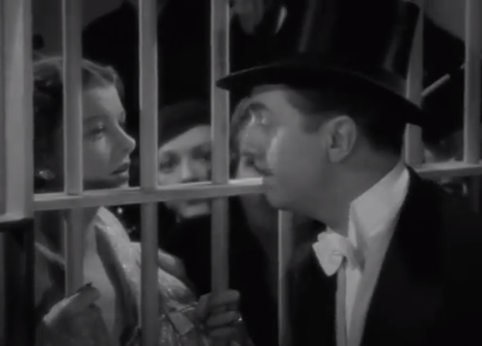
The reason to watch The Thin Man series was never murder. Sure, like its predecessor, this follow-up has the pretense of a mystery plot but that’s merely a trifle in comparison to the return of Nick and Nora Charles.
The novelty of this picture is no longer that it once more brings crime and comedy together because that’s what the original film did. We already have the formula, the groundwork set before us, and certain expectations. But what it does even in its opening vignettes is further develop its leads by transplanting the New York socialites to the world of San Francisco which brings with it different colorations and really an extension to this fanciful world that they live in.
William Powell and Myrna Loy are just delightful with teasing ever whip-smart interplay but we also see the class dimensions being played up too. All of a sudden, their marriage of such stark opposites comes into clearer focus and we love them even more.
Nick seems to know someone on every street corner most of them being hoods and shifty conmen begging the question just what he did in his previous life (I can’t ever remember being told)? Meanwhile, Nora comes from money and runs in a certain society that’s slightly averse to the constant verbal barbs and nose-thumbing of her husband. You see, he seems to have no respect for respectable folks. Her family can’t stand Nikolai as he’s called. But he loves his wife and she loves him.
The fact that the action is set over The New Year blesses the film with jovial gaiety and champagne bubbles that add a little pizzazz to your run-of-the-mill murder of passion. Meanwhile, the dubious Lychee Club takes its place front and center because a couple implicated persons are tied up with the establishment. One of them, named Dancer, runs the joint while his star performer Polly and her brother Phil also seem caught up in something shady. If you had to put a name to it you might call it extortion.
Then a slimy playboy (and unfaithful husband) is found murdered after a night carousing at the club with the chorus girl. That effectively gets his devastated wife accused of murder with her longtime beau (James Stewart) going to great lengths to defend her.
We could keep running off the list of suspects but to no avail, and it has the typically gung-ho cop Lt. Abrams (Sam Levene) understandably suspicious as he tries to make head or tails of the whole mess. Of course, he has Nick Charles on his side and a good thing too.
Asta is up to his old tricks running off with a vital clue and Nick’s up to his old tricks having his wife locked up in prison so that he can bail her out. Despite her longsuffering lot in life, she gets in some comic retribution of her own while maintaining a dazzling marriage full of mutual understanding.
Because, in one sense, Nick Charles is a complete imbecile, a habitual jokester, and yet he’s just serious enough to warrant some respect in the crime-solving trade and just sincere enough to hold onto his wife for posterity. Again, that’s all part of his charm. If he wasn’t so good at solving crimes, it’s doubtful people would give him the time of day. Though his wife does continuously and that’s what really counts. That’s the heartbeat of this entire franchise.
The Charles also realize humanity’s aspirations of sleeping the day away and it’s true they can get away with settling down for breakfast just as everyone else is finishing up dinner. That’s their lifestyle. I’m sure most of us hold a deep-seated desire for it in some cockeyed way. But most of us can’t solve murders on a whim either. So they get to be our surrogates on both accounts.
I won’t say he’s the epoch of amateur sleuthing, as the company includes the Sherlock Holmes, Miss Marples, and Jessica Fletchers of the world, but Nick Charles is one of the wittiest individuals to hold the mantle.
It must be noted that he was a creation of the Depression, a needed respite from the day-to-day, but you get the sense that today he comes off as a bit callous. Surely a man who knows so many undesirable characters was aware that there was a Depression on. And yet you see, that’s precisely the trick. In this world, such an event does not exist.
There’s no need to worry about it and this alternate reality instead gets to occupy itself with murder and excess, jokes and romantic patter. It truly is escapism and a gift to the masses. No wonder people loved Nick and Nora so much because it really does seem like they filled a need at the time.
While he’s not the center of attention nor is his role all that meaty until the final moments, James Stewart is nevertheless entertaining in this early part with a slam-bang finish that gives a glimpse of the passionate intensity he offered as an actor. It was full steam ahead for both him and The Thin Man series though you might say his future was a little more promising.
4/5 Stars

I so love the thin man’s movies I discovered them on TCM. I was surprised by them. Nice reviews.
LikeLiked by 1 person
Thank you! I’ve grown to love WIlliam Powell and Myrna Loy
LikeLike